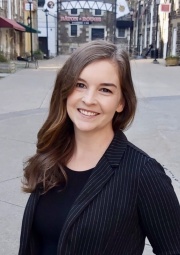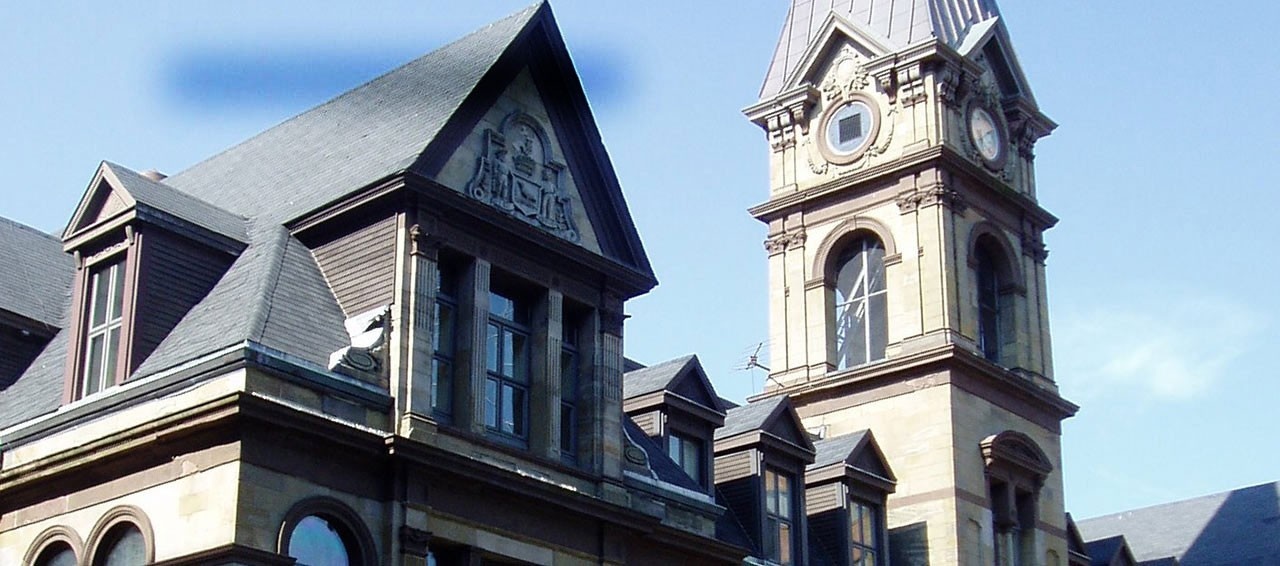Amy MacKenzie
MA '19

I wanted a community environment rather than a highly competitive and cold graduate experience.
Degree: Master of Arts – Political Science
Specialization: International Relations
Graduation Year: 2019
Current Job: Research Associate at Group ATN Consulting
Why I chose Political Science:
I’ve had a long-standing interest in why policy decisions are made and how they can address – or fail to address – social justice issues. As someone who grew up in rural Nova Scotia, I developed an interest in why some areas of the province and some segments of society struggle while others thrive. I originally wanted to explore these issues as a journalist, but after receiving a degree in journalism and working as a daily newspaper reporter, I realized I wanted to dig deeper into why things are the way that they are and how they can be improved. I wanted to write the studies I was reporting on.
I decided to leave my career as a journalist and returned to St. Thomas University to complete an Honours in Political Science with an ultimate goal of attending graduate school and researching policy decisions.
Political Science is really the study of power and that is what drew me to the subject. I wanted to explore power relations between those who hold the power - policy makers - and those who may be adversely affected by their decisions and why that happens.
Why I chose Dalhousie:
I chose Dalhousie because of the alignment of my research interests with those of the department’s faculty. After spending several years away, I also had an interest in returning to my home province. Dalhousie’s Political Science department also had two research centres that directly aligned with my research interests: The Jean Monnet European Union Centre for Excellence and the Centre for the Study of Security and Development, which I knew would afford me opportunities to learn outside of the classroom and library. I was also coming from a small liberal arts school, so the size of the department was appealing to me. I wanted a community environment rather than a highly competitive and cold graduate experience. I was also the recipient of a generous funding package including the Keens-Morden Scholarship, which made the decision very easy.
My MA Research:
My thesis research was focused on a critical analysis of the European Union’s policies related to the protection of asylum-seeking unaccompanied minors. Unaccompanied minors are children who migrate without their parents or a guardian, usually through the use of smuggling networks, and who were going missing at EU reception centres at alarming rates during the 2015-2016 surge in migration from the Middle East and North Africa to Europe.
Studies found that many of the children who fled EU reception centres did so due to abuse, threats of deportation, living in prison-like conditions with no communication on timelines, and overall treatment as criminals – conditions that violate the UN Convention on the Rights of the Child, the Refugee Convention and the EU’s own policies on the protection of unaccompanied minors. What interested me in this topic, among many things, was where this was taking place. The EU is a region based on liberal democratic norms and many of the countries in the EU contributed to the establishment of the international laws and rights that intend to protect these children. My research focused on explaining why EU policies that intend to protect unaccompanied minors failed in practice between 2015-2016.
My Experience at Dalhousie:
I was very involved during my year at Dalhousie. I worked as a Teaching Assistant for three international relations courses and I worked as a Research Assistant for Dr. Hayden in the Centre for the Study of Security and Development, which led to my first co-author credit on a book chapter that is currently in publication. I also worked as a student assistant in the Political Science office, which was a great experience that introduced me to basically everyone in the department.
I was also involved in the Jean Monnet European Union Centre for Excellence and assisted with the facilitation of their conferences – including one that focused on the use of social media by international organizations such as NATO and the UN, and one that focused on implications the Comprehensive Economic Trade Agreement. I was also involved with the Centre for the Study of Security and Development and helped facilitate its events including the Beyond GDP conference that brought leading experts in well-being focused policies and budgets to campus. I was also involved in the Third Century Symposium – a large conference of Dalhousie Political Science Alumni.
I would advise any graduate students coming to Dalhousie to do the same and be as involved as possible and take advantage of all the learning and networking opportunities you have. It’s easy to say no to the many opportunities that come up given the demanding nature of a one-year MA program but saying yes to these opportunities enhanced my learning experience. Networking within the department also introduced me to many professional contacts and led to my involvement in Women in International Security – an organization that has broadened my professional network across Canada and gave me a platform to share my research on a national level.
The courses I took at Dalhousie were both challenging and rewarding and my thesis work was enhanced by the multiple opportunities afforded to me to present my work to the academic community. I was honoured to receive the Doris Boyle Graduate Prize, JMEUCE Graduate Award and JMEUCE Research Grant for my course work and thesis. I also won first place in my category of the Women in International Security 5-minute thesis competition at University of Toronto, an experience that helped me refine my thesis argument prior to my defence.
Overall, I was given all the support and tools I needed at Dalhousie to succeed in my program.
What I’ve been doing since graduating:
The day after I graduated, I started working as a researcher at Group ATN Consulting in downtown Halifax. The research varies from day to day, but the majority of the projects I work on focus on economic, social and policy research. The projects we undertake include economic development strategies, feasibility studies, policy development, policy reviews, and socio-economic impact studies. These research projects are completed for government (federal, provincial and municipal), non-profit organizations, private-sector, and Indigenous government clients in areas such as regional economic development, fisheries, tourism, immigration, education and Indigenous capacity building. We use multiple methods in our research including surveys, interviews, engagement sessions, data analysis, case studies, and literature reviews.
It’s been a busy year since graduating as I’ve contributed to some 50 research projects in this role. I really enjoy the work that we do, in particular socio-economic impact studies and working with Indigenous Communities and enterprises in advancing their development goals. It’s very rewarding work.
How Dalhousie helped me in my current career path:
Dalhousie’s MA program is very research intensive and the guidance and mentorship I received from my thesis supervisor and professors prepared me for bringing my research skills from academia to the working world. It also broadened my perspectives and challenged my assumptions. I feel my current work directly benefits from the knowledge and skills I gained at Dalhousie.
I learned so much about issues that are very close to my heart at Dalhousie and now I’m lucky enough to be working on these issues in a local context in my home province. I’m very passionate about social justice issues and addressing inequalities, so applying my research skills to assist Indigenous governments and organizations on projects that aim to move the needle for their Communities is very rewarding work. I’m very grateful to Dalhousie Political Science for providing the foundation to allow me to work in my field right here at home.
